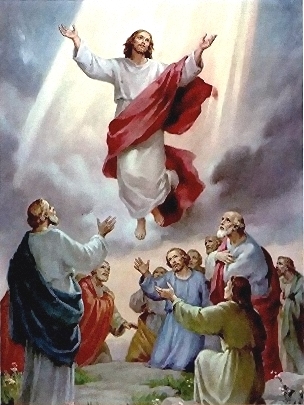Our Lord has ascended into Heaven to sit at the Father’s right hand, but before he goes he makes sure we know that his mission is now our mission, and promises that the Holy Spirit will help us, a fact that we’ll celebrate soon on Pentecost.
In today’s First Reading Saint Luke reminds us that with Our Lord’s Ascension our chapter as Church of helping salvation history to continue begins. It’s not by chance that Saint Luke wrote two books: when Our Lord’s work on earth concludes, his earthly ministry, the Gospel as the story of what Our Savior said and did during his earthly lifetime—from Incarnation to Ascension—ends. As the events of the Gospel end, ours begin.
Saint Luke begins the Acts of the Apostles with a recap of what happened in Our Lord’s earthly life before launching into how the Church took up Our Lord’s mission and continues to carry it out. The Apostles didn’t act right away. Our Lord took the lead during his earthly ministry, but also promised them the help of the Holy Spirit. The Holy Spirit is poured out in a special way to help the Apostles take the lead now. Ascension is followed by Pentecost, the day the Easter season draws to a close. The Lord is Risen and Ascended and now it’s time for us to take up the work.
In today’s Second Reading St. Paul prays that we have everything we need to carry out Our Lord’s mission. We need wisdom and revelation, and the Spirit gives us the wisdom and revelation to know God. We need the insight of an enlightened heart to know that which is truly worthy of how hope and how wonderful it is. An enlightened heart also believes in the power of God, the power that raised his Son from the dead and set him above all things, including his Church. We may be taking up Our Lord’s mission, but Our Lord is still in charge in a vital and intimate way, just as a head is vital to the whole body, ensuring its health and growth.
In today’s Gospel Our Lord makes it clear that the work is just beginning. In today’s First Reading the Apostles seem confused, thinking the work is over, but the Lord makes it clear that there is a lot of work to do. The stakes are high: people need something to believe in, and just as Our Lord came so we could believe in him, we must go out and invite others to believe in him as well. There was a whole world that did not know Our Lord, and even today too many don’t know him. Our Lord wants to reach them through us.
Our Lord has Ascended. He intercedes for us and directs us from the right hand of the Father, but he is now counting on us to spread the faith. Have you spread the faith with your family, your friends, your co-workers? There are many people in our world who don’t truly know Our Lord and live incomplete lives. We can help them to live.
Readings: Acts 1:1–11; Psalm 47:2–3, 6–9; Ephesians 1:17–23; Mark 16:15–20.


